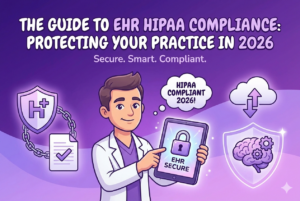AI Chatbot for Healthcare: Revolutionizing Patient Engagement and Care
30 Jul 2025 By: Vlade Legaspi
Updated
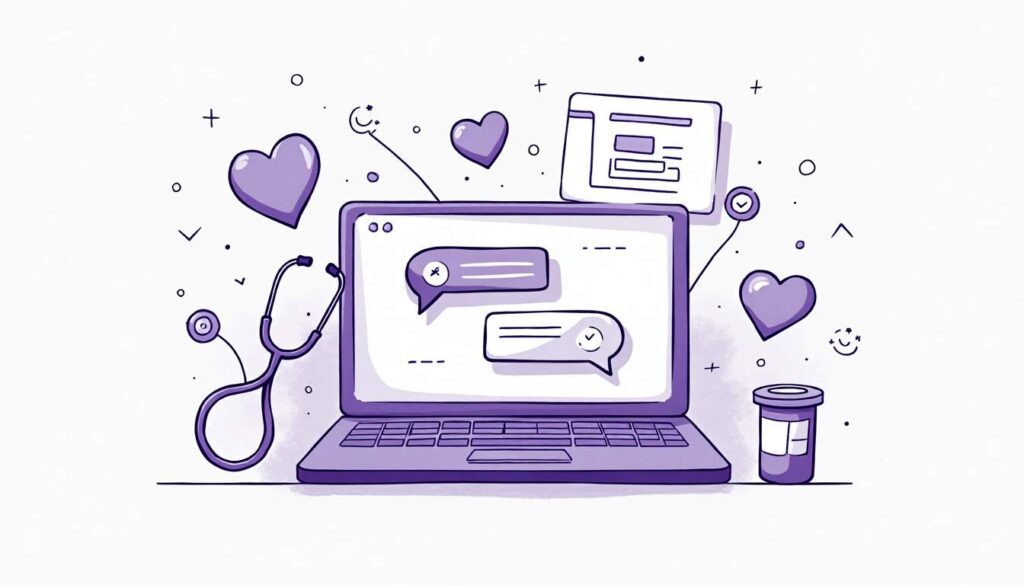
An AI chatbot for healthcare is a virtual assistant that chats with patients 24/7 to answer basic questions, guide symptom triage, book appointments, and support follow-ups. It improves patient engagement by sending reminders, explaining health info in plain language, and helping people stay on track between visits. For example, a diabetes chatbot can suggest daily meal tips and medication reminders while flagging concerning symptoms for a clinician to review.
The research examines the impact of AI chatbots on patient healthcare delivery. The paper examines both the advantages and disadvantages and projected developments of these systems. The bots provide easy access to healthcare services while accelerating communication and assisting patients with their medical and mental health needs.
Understanding AI Chatbot For Healthcare
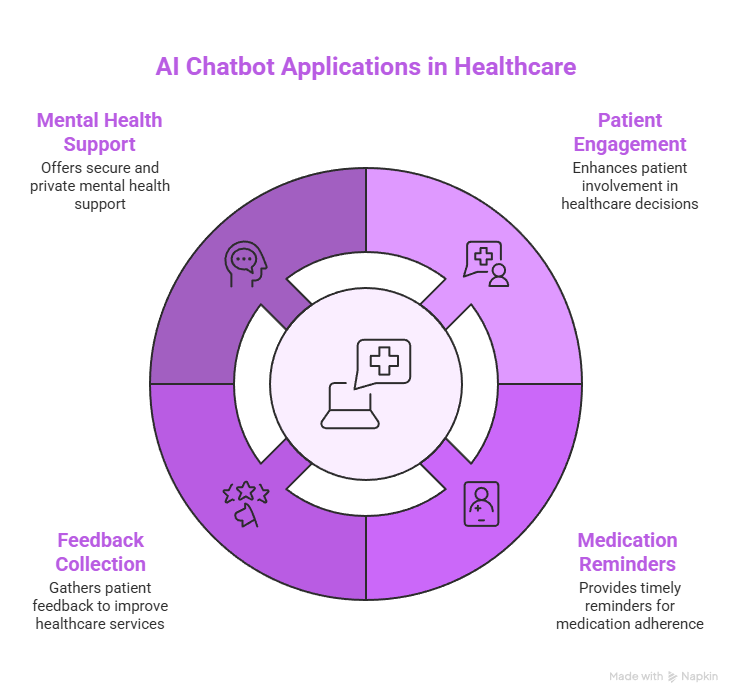
What Are AI Chatbots?
AI chatbots operate as tools which implement language technology and learning capabilities to generate human-like conversations. Healthcare chatbots operate through mobile applications and websites to provide information and direct users through their interactions.
Smart AI chatbots differ from previous bots because they acquire knowledge through both chat interactions and data analysis. The system detects emotional tones while understanding the conversation context to create responses that feel authentic.
The bots maintain connectivity with health records systems. The system retrieves patient information to provide recommendations that consider medication history and allergy records. The system produces safer and more useful responses.
The Role of AI Chatbots in Patient Engagement
Patient engagement requires patients to actively participate in their healthcare decisions. Patients who are engaged in their care maintain their treatment plans and schedule appointments and select healthier lifestyle choices. AI chatbots enhance patient engagement through their continuous availability of assistance.
The system provides medication reminders and responds to basic inquiries and leads users through their care procedures. Patients who live in distant areas benefit from this system because it enables them to stay informed and maintain their connection to healthcare services.
The system enables patients to provide feedback through its chatbot functionality. The system enables providers to monitor patient satisfaction levels while identifying areas for service improvement. The collected data enables healthcare providers to enhance the quality of their services.
The mental health chatbots provide users with secure private conversation spaces. The system provides users with coping strategies and support mechanisms. The system enables people to begin their journey toward seeking help.
Key Benefits of AI Chatbots in Healthcare
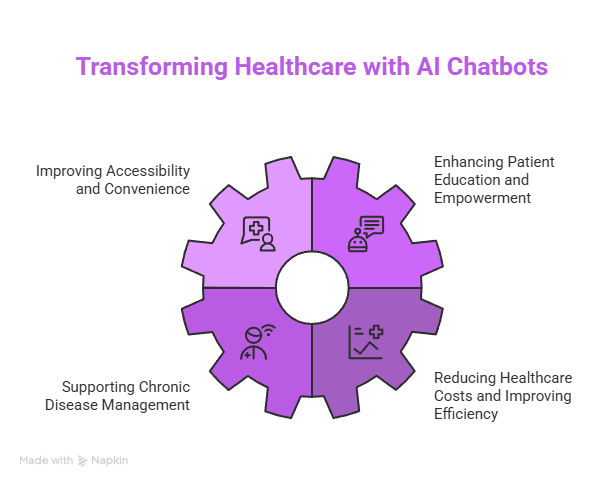
Improving Accessibility and Convenience
The healthcare system remains challenging for numerous people who reside in rural areas. AI chatbots provide immediate assistance at any time from any location.
Patients can use the system to ask health questions and book visits and check symptoms immediately. The 2023 Accenture report indicates that basic care trust in AI systems has reached 60% among the population.
The simplified system reduces the workload on hotlines and emergency rooms. The medical staff can concentrate on treating complex cases because chatbots manage basic healthcare responsibilities.
The implementation of chatbots enhances patient engagement. The system provides users with reminders and helps them monitor their care while offering step-by-step guidance. The system results in enhanced health outcomes together with reduced instances of missed care steps.
Enhancing Patient Education and Empowerment
The process of teaching patients effectively enables them to manage their diseases while preventing potential complications. AI chatbots generate personalized recommendations through an analysis of individual patient requirements and personal history.
The system defines medical terminology through simple explanations. The system enables patients to understand their medical care better which leads to improved decision-making. It builds trust and clear thinking.
A diabetes chatbot provides daily recommendations about food choices and exercise routines and blood sugar management. The reminders promote healthy behaviors while strengthening patient self-assurance.
The system provides mental health support through its chatbot functionality. The system provides guidance along with relaxation techniques and emotional assistance. The system creates feelings of security which prepares users to seek help during critical moments.
Supporting Chronic Disease Management
People with diabetes and asthma require ongoing medical care to manage their conditions. AI chatbots assist patients through sign tracking and medical alert systems and problem detection warnings for doctors.
Research conducted in 2022 demonstrated that patients who used chatbots for high blood pressure management increased their medication adherence by 15% while achieving better blood pressure results during six months.
The daily operations of chatbots function as assistance tools. The system provides support to patients during their time between doctor appointments while maintaining their treatment schedule.
The system provides quick updates to healthcare teams. The chatbot system sends alerts to doctors when patients’ symptoms become worse. The quick response system protects patients while maintaining their connection to healthcare services.
Reducing Healthcare Costs and Improving Efficiency
AI chatbots reduce administrative work by performing tasks such as booking appointments and triage and follow-up procedures. The system reduces costs while delivering faster medical care.
The Mayo Clinic discovered that their chatbot system reduced emergency room visits by 20% which resulted in annual savings of millions of dollars. The system quickly identifies situations that require immediate attention.
The implementation of chatbots simplifies the delivery of healthcare services. Patients benefit from immediate access to information while avoiding prolonged waiting times. The system enhances patient satisfaction while reducing the time needed for care delivery.
The improved workflow enables medical staff to dedicate their time to patient care instead of administrative work. The entire system operates more efficiently and intelligently through this implementation.
Real-World Applications of AI Chatbots in Healthcare
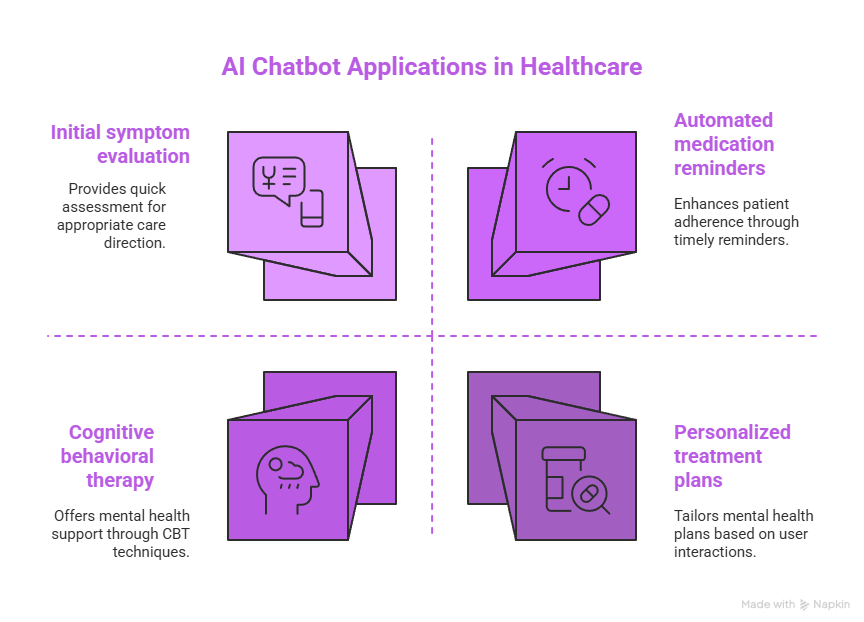
Symptom Checking and Triage
AI chatbots serve as a primary tool for initial symptom evaluation in medical practice. Patients use the chatbot to describe their symptoms which then determines the severity level and directs them to either self-care instructions or doctor appointments or emergency services.
The symptom checkers of Ada Health and Buoy Health have become popular because they utilize extensive medical databases together with AI algorithms to deliver precise assessments. The tools decrease the number of clinic visits that are not needed while enabling patients to take control of their healthcare choices. The accuracy of these chatbots increases through user interaction learning which results in enhanced patient outcomes. The implementation of AI chatbots in healthcare systems improves both patient care and triage efficiency by providing fast responses that help in urgent medical situations.
Mental Health Support
AI chatbots have demonstrated significant potential in the field of mental health. The conversational interfaces of Woebot and Wysa deliver cognitive behavioral therapy (CBT) methods along with mood tracking and emotional assistance to users. Users can access a confidential space through these chatbots to share their emotions while getting help with coping mechanisms.
The COVID-19 pandemic increased mental health service requirements while AI chatbots stepped in to address the shortage of available therapists. Research shows that mental health chatbot users experience decreased symptoms of anxiety and depression which demonstrates their value as supplementary mental healthcare resources. The analysis of user interactions by these chatbots enables the identification of mental health patterns which produces useful information for healthcare providers. The collected data enables healthcare professionals to create personalized treatment plans while gaining insights about mental health patterns across the population which results in better individualized care for those in need.
Post-Discharge Follow-Up and Medication Adherence
The success of patient recovery depends on their strict adherence to discharge instructions and medication regimens to avoid hospital readmissions. AI chatbots perform automated follow-up calls to monitor patient status while providing timely medication reminders to patients.
A United States hospital system achieved a 12% reduction in 30-day readmissions through its chatbot-based follow-up program. The patients received individualized care and immediate responses which boosted their ability to handle recovery independently. Through educational conversations about medication side effects and potential interactions these chatbots enable patients to gain knowledge about their treatment. AI chatbots create a sense of responsibility while offering continuous assistance to improve patient results and enhance the hospital-to-home care transition process.
Challenges and Ethical Considerations
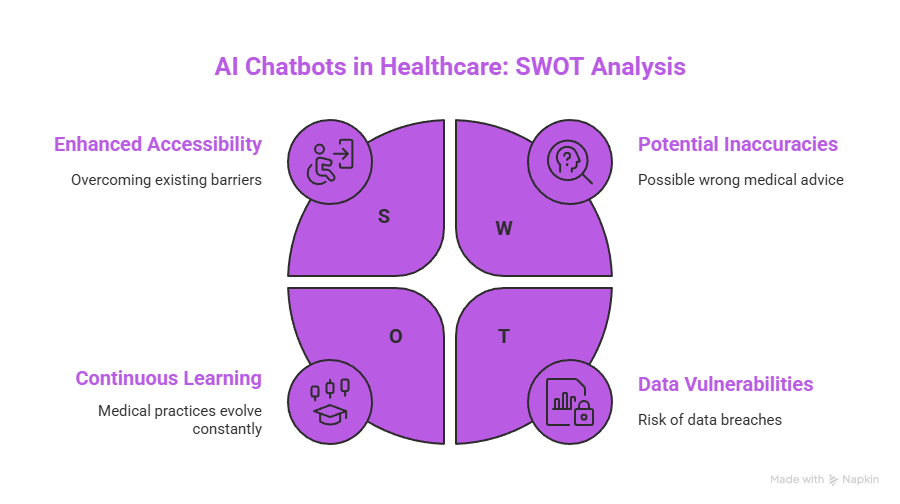
Data Privacy and Security
Health data remains private so AI chatbots need to comply with HIPAA and GDPR regulations. User trust develops through the implementation of data protection measures.
The construction process requires powerful security measures which include encryption and access restriction systems. The system requires users to grant consent before data collection while maintaining complete transparency about data usage.
Data leaks are a big threat. Hackers can steal IDs or use info wrongly. The implementation of regular checks enables quick detection and resolution of security vulnerabilities.
Users need to understand safety practices as part of their learning process. Users must recognize scams while learning to modify their privacy settings. Safety becomes a collective responsibility when everyone works together.
Accuracy and Reliability of Information
AI chat provides useful advic,e yet doctors remain essential for medical care. The system’s failure to read input correctly or its operational breakdown can result in wrong medical advice.
The development of safe bots requires developers to perform thorough testing and maintain frequent information updates and establish clear boundaries for the chatbot system. The combination of human oversight with AI systems produces better results.
The medical field requires AI to continuously learn new information because medical practices evolve. Users who report errors enable better accuracy and trust development in the system.
The combination of real patient data with clear health rules enables bots to become more intelligent. The system establishes trust while enabling users to make improved decisions.
Addressing Health Equity and Accessibility
AI chatbots enhance accessibility yet they do not eliminate all existing barriers. Some users face challenges because they do not have phones or internet access and they encounter difficulties with language and cultural differences.
The system needs to operate in multiple languages and support different reading comprehension levels. The system becomes accessible to a wider range of users.
The AI system needs to prevent the reoccurrence of health data biases from previous times. Developers need to test their bots with different groups to prevent unfair care outcomes.
Local partnerships enable the teaching of technology skills and expand access to services. The implementation of inclusive design methods enables fair healthcare services to reach more individuals.
The Future of AI Chatbots in Healthcare
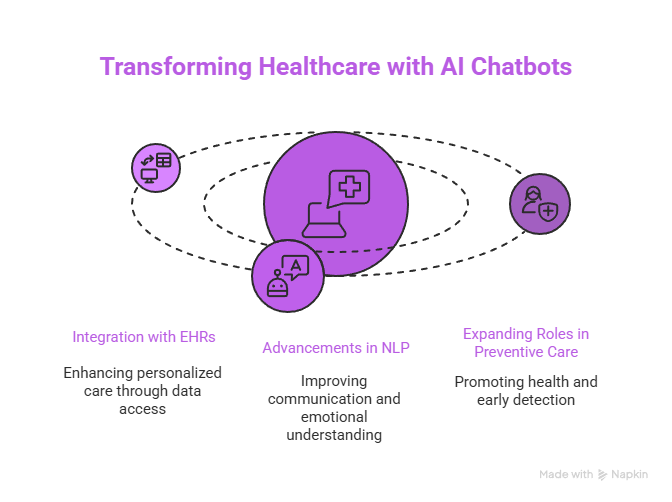
Integration with Electronic Health Records (EHRs)
Future AI chatbots will link with EHRs to access patient records, lab results, and care plans. This will boost personalized care and smart support.
With real time data, bots can send reminders, suggest follow-ups, and alert doctors to new risks. This keeps care on track and timely.
These tools cut admin work and help patients stay involved. Custom health tips and alerts build better habits and trust.
Smart chatbot-EHR links will shape faster, safer, and more personal care for every patient.
Advancements in Natural Language Understanding
As NLP grows, chatbots will grasp complex questions and spot emotions. This will lead to more human, caring chats that build trust.
Bots may use emotion checks to sense how a patient feels. They can then respond with the right tone and support.
This makes patients feel heard, easing fear and stress. It’s key in care, where comfort often matters as much as facts.
Future bots will also speak many languages. This breaks language walls and helps more people get the care they need.
Expanding Roles in Preventive Care and Population Health
AI chatbots will boost preventive care by spotting risks, pushing healthy habits, and catching issues early.
Health groups can use bots for big campaigns and to track outbreaks fast. Bots can gather health data and share flu tips or vaccine info.
They can also tweak messages to fit different groups. This makes the advice clearer and more useful to each community.
By guiding better habits and early care, bots can ease pressure on clinics and help more people stay well.
Trending Now!
AI chatbots are reshaping healthcare by offering 24/7 access to medical help, easing the load on staff, and improving patient engagement. These bots guide users through symptoms, book appointments, and share health info. They also support mental health, manage chronic conditions, and help with follow-ups. Real-world examples, like Babylon Health and Woebot, show how chatbots improve outcomes and make care more accessible.
The article also highlights challenges like data security, misdiagnosis risks, and tech limits. It stresses the need for clear rules, accurate data, and human oversight. Still, the future looks bright as AI chatbots grow smarter and safer. With the right tools and strategies, healthcare providers can use them to boost care quality and patient satisfaction.
Conclusion
AI chatbots transform healthcare by providing patients with enhanced accessibility and personalized care through efficient services. Through their capabilities patients gain access to information and receive support for managing chronic diseases and mental health care while healthcare costs decrease. The ongoing technological progress and strategic implementation methods show promise to resolve privacy issues and accuracy problems and equity disparities.
AI chatbots will establish themselves as essential healthcare tools because healthcare systems worldwide aim to develop patient-centered data-driven care systems. The adoption of this technology enables better health results while building a healthcare system that responds to diverse patient needs.
Helpsquad Health enables you to deliver these advantages to your patient population. The AI chatbots at our disposal provide continuous support while enhancing care delivery and enable your team to concentrate on delivering better outcomes.


